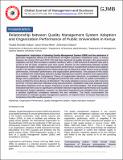Relationship between Quality Management System Adoption and Organization Performance of Public Universities in Kenya
Publication Date
2018-07Author
Gulali Donald Indiya, Jairo Kirwa Mise, Johnmark Obura
Metadata
Show full item recordAbstract/
Organizations’ implication of adopting Quality Management System (QMS) and the resistance it generates negatively affects the performance of Higher Education Institutions (HEI). In Kenya between the period 2014 and 2015, HEI had been deprived of quality through a 6% government capitation cut and 28% increase in student numbers, with a 1:500 lecturers to student ratio and a 14.3% of the 28 week, academic year time waste. Studies on the relationship between Quality Management System adoption and organization performance revealed both positive and negative results. Past studies suggest that the relationship may be affected by other factors such as quality performance, innovation performance and organization performance. The purpose of this study is to establish the relationship between Quality Management System adoption and organization performance. Guided by Contingency Theory of organization structure, a correlation research design and a population of 215, management personal was used from 11 public universities in Kenya certified by Kenya Bureau of Standards. The study adopted a census survey with response at 94.4%. Primary data was collected using questionnaires. Qualitative data was analyzed using descriptive statistics such as means, frequency counts and percentages. The study hypothesis indicated that there was no significant correlation between organization performance and Quality Management System adoption; however, an alternative hypothesis was adopted since there was a positive significant correlation between the two variables. The study recommends the universities to maintain quality management systems, or improve them to ensure that they are institutions that offer quality services.

